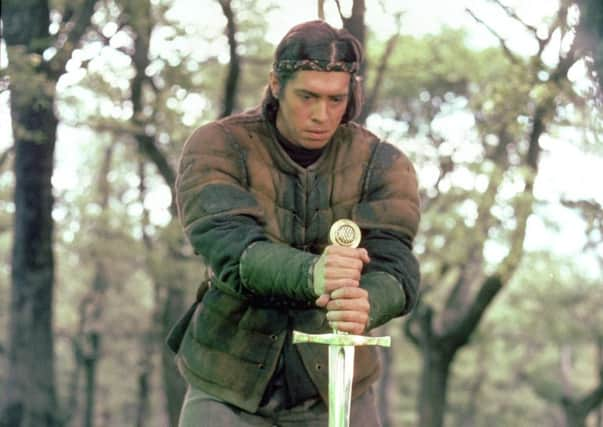Obituary: Nigel Terry, actor.


Nigel Terry played the legendary King Arthur in the 1981 epic Excalibur and the eponymous Renaissance artist in the 1986 film Caravaggio. But he seemed to shy away from stardom and although he had a supporting role a few years ago in the Hollywood blockbuster Troy, alongside Brad Pitt, he was as likely to be found in some fringe theatre or touring stage production.
Within the profession he was regarded as a mix of actor’s actor, bohemian and maverick, lacking the focus or perhaps the desire to make it to the top.
Advertisement
Hide AdAdvertisement
Hide AdThere is a story told about when he was a drama student and his long silences infuriated a flatmate. Finally his flatmate declared: “I can’t stand your f***ing moods.” After another long period of silence, as long as ten minutes or so the anecdote goes, Terry finally replied: “Moods?”
Terry made a fairly spectacular film debut as a drooling, moronic Prince John in The Lion in Winter in 1968, holding his own in a royal family that included Peter O’Toole as King Henry II, an Oscar-winning Katharine Hepburn as Queen Eleanor of Aquitaine and another feature film debutant, Anthony Hopkins, in the role of John’s elder brother, the future Richard the Lionheart.
He looked set for movie stardom, but five years later he was playing to tiny audiences in the Adam House Theatre in an Edinburgh Fringe production of Athol Fugard’s People are Living There. In 1976 he was back at the Edinburgh Fringe in Caryl Churchill’s Light Shining in Buckinghamshire, at the Traverse Theatre.
Excalibur threatened once more to turn him into a bona fide movie star. He played Arthur from teens to old age and had a particularly memorable death scene. Helen Mirren played Morgana, Cherie Lunghi, with whom Terry was once linked romantically, was Queen Guinevere and Liam Neeson was Gawain. But Terry left it four years before making another film.
After his death, the wife of one of Terry’s old school friends recalled a chance meeting. “One day, in around 1980-1, and at the height of Nigel’s success, my husband came upon him in Eastbourne sitting on a pavement leaning against a pub at about 9am.
“They exchanged greetings and it transpired that Nigel, under the influence of ‘whatever’, had got on the wrong train from London late the previous night, ended up in Eastbourne and had spent the night on the beach. Quite a character!”
He was born Peter Nigel Terry in Bristol in 1945, the son of a decorated RAF pilot who subsequently worked as a probation officer in Truro, Cornwall, where it was that Terry grew up and where he based himself in later life.
At school Terry developed an interest in both painting and acting. He joined the National Youth Theatre and, after briefly working in forestry and as a petrol pump attendant, he studied at the Central School of Speech and Drama in London and began his acting career in theatre.
Advertisement
Hide AdAdvertisement
Hide AdHe was a handsome figure and could be both brooding and commanding. Many of his best roles and most memorable performances were in period pieces, going right back to The Lion in Winter. During the 1970s and 1980s he worked with the Royal Shakespeare Company. He was Casca in Julius Caesar and the title character in Molière’s Don Juan at the National Theatre.
His performance in Excalibur might once again have been expected to lead to big-budget Hollywood movies, but instead Terry established an ongoing working relationship with the English arthouse director Derek Jarman.
He appeared in five of Jarman’s films – Caravaggio, with Tilda Swinton and Sean Bean, The Last of England, War Requiem, Edward II and Jarman’s final film Blue.
By that time Jarman had AIDS and was almost blind. The screen was simply an unchanging bright blue throughout. Terry, Jarman, Swinton and John Quentin spoke about Jarman and read from his journals. The soundtrack also included music and sound effects. It was an oddly moving work.
Terry also appeared in dozens of television dramas, including such staples as The Bill and Casualty. In the 1990s the medieval drama series Covington Cross reunited him with Cherie Lunghi and he was the ill-fated Mr Boldwood in Granada’s adaptation of Far From the Madding Crowd.
Doctor Who provided him with one of his last credits in 2008 when he played a general who tries to kill the Doctor (David Tennant).
In the 1990s he also moved from London back to Cornwall to be near his parents in their final years. Terry was a very private person, living alone in a cottage outside St Ives, enjoying the relative solitude of Cornwall and who might often be found wandering by himself along the cliffs.
He continued acting, with Cornwall as his base, and was the high priest Archeptolemus in Troy, alongside Pitt’s Achilles, his old friend Peter O’Toole as the Trojan king Priam and Sean Bean as Odysseus.